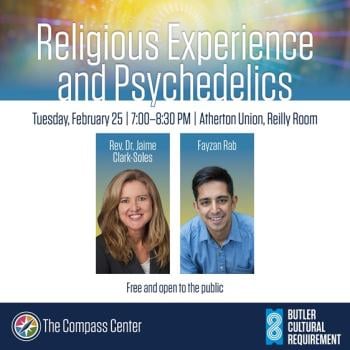Keith Ward is an author for whom I have a great appreciation. His book What the Bible Really Teaches
was and is enormously important to me in helping me become comfortable in my identity as a Liberal Christian. I am thus always eager to read his latest book. But I admit to feeling some trepidation at the prospect of reading the copy of More Than Matter?: Is There More to Life Than Molecules?
which Eerdmans, the publisher, kindly sent to me, and for which I am very grateful. The questions posed in the title, and the blurb and publicity material, gave me the impression that Ward might be seeking to defend the traditional view of an immaterial soul as a separate substance from the material body, a position that I have come to find untenable, like most people who’ve studied either what neuroscience tells us or the development in views on this matter within the Biblical literature, if not both. Would I have to have the disappointing experience of finding myself parting company with an author whom I admire and whose other writings I value?
As it turns out, my initial impression was wrong. Ward describes a good philosophy book as one which you believe for at least as long as you are reading it, and perhaps for a little while after finishing it (p.13). Having finished reading Ward’s book, I think that it is leading me to recategorize my worldview and my philosophical stance in important ways, which involve not a mere relabeling of what I already thought but a reconfiguration in important ways.
Ward interacts with a number of philosophers throughout the book, but his main conversation partner is Gilbert Ryle, who was Ward’s professor and adviser at Oxford. Ryle is less well known then Wittgenstein but had a similar approach to philosophy. He emphatically argued against Descartes and the idea that there is a “ghost in the machine.” Ward himself does not introduce a ghost, but nonetheless seeks to rehabilitate Descartes. (If there is something I would have liked to see more of in the book, it is actual discussion of Descartes’ own views in his own words, to clarify whether and to what extent they are in fact open to being understood in the manner Ward proposes).
After outlining a variety of views ranging from materialism through non-reductive physicalism to idealism, Ward situates himself towards the latter end of the spectrum, in a form of idealism which can also be accurately categorized as a form of monism and as a form of dualism. It could be called “dual aspect idealism” (p.103). Ward’s argument is not that there is a spiritual substance, but that consciousness is the “inner aspect” of matter, especially in particular configurations of matter (drawing here on process philosophy). And so it is monistic in the sense that he does not view consciousness as rooted in a separate substance which belongs to or resides in a separate world from matter. But it is dualistic inasmuch as consciousness and qualia are not reducible to material entities or describable in material terms, but have a genuine existence. And so, while many of us may have thought along similar lines and considered ourselves non-reductive physicalists, Ward argues that the viewpoint he advocates should not be considered “physicalism” at all in the sense that there is no way to describe thoughts, feelings, or perceptions in physical terms.
Ward argues the case powerfully and, in my view (at least for the moment) persuasively. The central point of his case is that the experience of seeing red (literally, but also metaphorically) is not reducible to any sort of physical description – whether wavelengths of light or firing of neural synapses. Enjoying the beauty of a symphony is a different sort of thing than any description of the frequencies of vibrations. Consciousness is its own sort of thing, it is real, and it adds properties to the universe, such as values and meanings. Far from being things that ought to be disputed based on scientific analyses, consciousness and its properties are in fact the things that we can be most certain of, because we experience them most directly. And so inasmuch as one understands his talk about the soul not as a spiritual “substance” but in terms of consciousness and spiritual “properties” not reducible to (even if inseparable from) physical things, Descartes can indeed be defended and rehabilitated.
Ward fills his book with humor (most of the time it is genuinely entertaining), such as when he says that “The extreme materialist view that consciousness is an illusion can only be consistently held by philosophers who are not conscious” (p. 34). And he puts things provocatively when he adopts older terminology to new uses – as for instance when he talks about whatever preceded the existence of the natural spacetime we inhabit – whether a set of quantum laws that allowed a universe to come into being, or something else – as being a “supernatural” reality – again, not in the sense that it is a giant tinkering person without a body, but in the sense that it transcends, precedes, is distinct from, and brings about the existence of the “natural.” Ward’s book seeks to rehabilitate the “soul” and idealism, but also the broader philosophical pursuit of metaphysics itself. He does so in a manner that embraces the insights of the natural sciences, while also explaining why the success of science should not lead to materialism. As he puts it towards the end of the book, “the exclusion of the personal from the realm of natural science does not exclude it from reality” (p.203).
The book also touches on matters of value and morality, and science fiction gets several mentions. The book ends by considering the relationship of idealist philosophy to religion.
Ward’s book is a fantastic and much-needed defense of the appropriateness of metaphysics and the need to do justice to the breadth and depth of our experienced reality in a non-reductionistic manner. Materialism ultimately fails to do justice to the fact that that which we are most certain of, that which we perceive directly, is perception itself and consciousness itself. Hopefully Ward’s book will stimulate discussions that will move intellectuals in a range of fields – philosophy, the natural sciences, theology, and various others – to have stimulating conversations around the need to find ways of thinking about the nature of reality and the nature of persons in ways that do justice to all that we know and experience ourselves to be. For as Ward himself puts it, “I think there is no more important question in the whole of philosophy and in the whole of life than that of what a person really is” (p.63). I heartily and whole-heartedly recommend this book.













